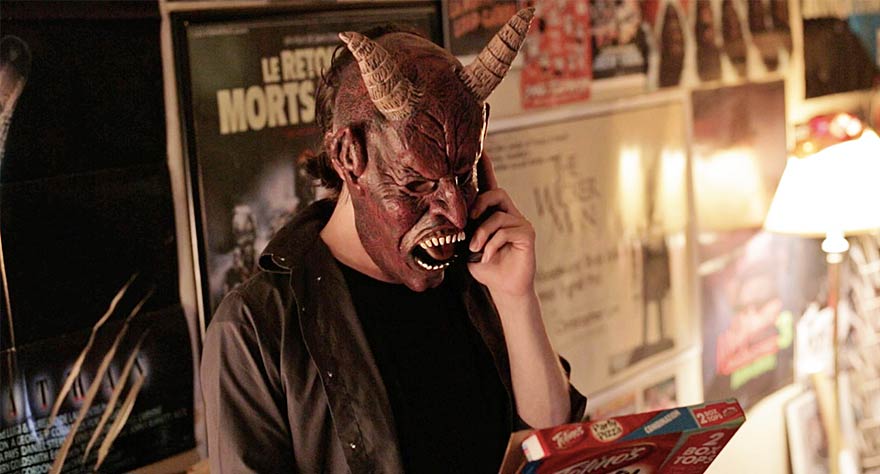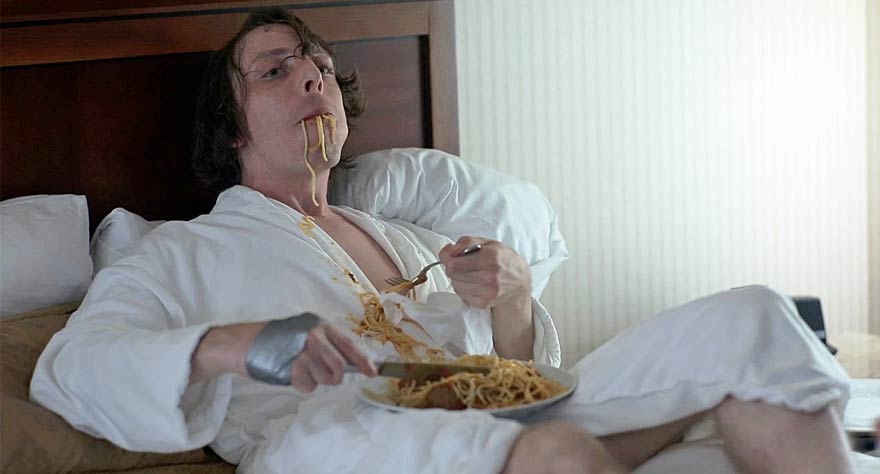
Compelling in its uncomfortableness, this indie dark comedy just works.


Compelling in its uncomfortableness, this indie dark comedy just works.

Bought up by Oscilloscope Laboratories days before its SXSW premiere, Buzzard received a lot of praise in Austin for which, up until today, I’ve been kicking myself for missing. Director Joel Potrykus presents a protagonist who’s hard to champion and impossible to ignore, a sullen yet boisterous con-artist with no remorse for his actions and a vague understanding of consequences. Like its lead character, Buzzard doesn’t shy away from being offensive and unapologetic, and because of it the film successfully pulls off a difficult combination of being brutally unsettling and strangely comedic.
Our title character Marty Jackitansky (Joshua Burge) isn’t the type who’s afraid to admit he’s trying to cheat the system. In an opening scene, Marty attempts to close his bank account just so he can re-open it for a free $50 sign-up bonus. During this entire five-minute scene, the camera remains fixed on the long-haired, bug-eyed anti-hero even while he waits for the banker to return with his money. Most films would have cut out the silent waiting bit, but this extra focus allows a closer study of him, a consideration of what might be going through his head. Capping off this brilliant and subtlety humorous scene, Marty reveals he actually works for the bank at another branch and is “absolutely” okay with scamming them, thoroughly confusing the banker.
The closest thing Marty has to a friend his is nerdy coworker Derek (played by the director), who channels his best impression of Kip from Napoleon Dynamite, swapping sitting in front of a computer chatting with babes all day for leveling up in video games all night. Derek not only tolerates Marty’s antics, he adds fuel to the fire by daring him to actually go through with them. Though it’s hardly a challenge since Marty is perfectly fine carrying out schemes on his own volition. His scams range from ordering extra office supplies from work then returning them in store for cash to cutting his hand at home then blaming it on the paper-cutter at work. But the ultimate score opportunity falls into his lap when his boss hands him a bunch of undelivered refund checks. Instead of finding proper mailing addresses for these checks, he forges the endorsement and cashes the checks himself.

It’s hard to tell if Marty’s scamming for financial reasons or for sheer entertainment. But trying to understand his motives is a fools errand, he simply doesn’t care about breaking the rules or taking advantage of other people. Eventually, the table turns when a convenience store clerk swindles Marty out of a few bucks, besting him at his own game. For the first time he’s completely vulnerable and for that brief moment it’s possible to feel an ounce of sorrow for him, even if he deserved it.
Part of what makes the film so wildly entertaining is there’s no telling what Marty will do next. Though, Buzzard is equally compelling on a visual level, making certain scenes impossible to forget. Like when Marty rapidly consumes an entire plate full of spaghetti and meatballs, spilling all over his clean hotel bathrobe, all while being completely satisfied by living in the moment. It’s an uncomfortable three minutes, but it’s undeniably memorable. So is the spine-tingling conclusion which cranks the surrealism volume to 11.
Suffice it to say, Buzzard isn’t for the faint of heart. Not that it’s overly violent, aside from a few scenes involving a modified Nintendo Power Glove resembling Freddy Krueger’s claws, it’s hard to stomach the way Potrykus forces a loathsome character upon us without defending or condemning him. On top of that, the film then has the nerve to ask us to sympathize with him, if only for a fleeting moment. But Potrykus’ decision not to criticize nor give justification for the repulsive Marty is a bold move that somehow works. More than just a workplace satire (Office Space seems cartoonish compared to it), Buzzard is an ugly but honest look at American capitalism which only seems fitting coming from indie cinema.